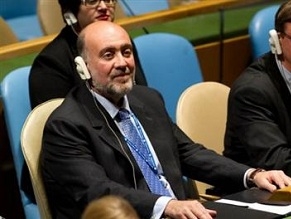|
World Jewish News

Ron Prosor, Israel's ambassador at the United Nations in New York.
|
Israel's UN envoy slams Iran at counter-terrorism debate
18.01.2013, International Organizations Israel's Ambassador to the United Nations Ron Prosor slammed key international players who “offer justification for certain terrorists, while condemning others”, as he launched a blistering attack on Iran for supporting an financing terrorism and thus generating the “tools to grow the next generation of terrorists”, at a counter-terrorism debate of the UN Security Council on Tuesday.
Contending that it is not sufficient to thwart terrorist plots wherever they emerge in the world or to sanction the financers of such terrorist activity, however, he added that genuine counter-terrorism “means advancing education that teaches peace, not hate, and mutual understanding, not martyrdom. It means speaking out against incitement and all forms of terrorism, even when it is politically inconvenient”.
“It takes a network to beat a network,” he continued, as he reflected on the increasingly transnational nature of terrorist organisations, singling out Lebanese militant group Hezbollah, who Israel have actively lobbied the EU to designate as a terrorist group without success, for making up “a network that spans from West Africa to Latin America to Europe. This global criminal network fund Hezbollah’s terrorist activities, and provides the logistical support to carry them out”.
Returning to his original charge, he said it had been proven that “in Gaza, Iran is funding, training and arming Hamas, Islamic Jihad and other terrorists”, as he cautioned Un member states that “we have a responsibility to prevent the world’s most dangerous weapons from falling into the hands of the world’s most dangerous actors”.
In a barely-disguised condemnation of the international community’s hesitancy to act definitively over the Iranian threat, having originally championed now dormant diplomatic talks, he asserted: “This Council cannot turn a blind eye to those states that sponsor, support, and arm terrorists. The international community must hold them accountable for the violence that they spread - and the lives that they have taken.”
Insisting the UN’s efforts must extend beyond the mere passing of resolutions, he concluded:
“We must take the words from the printed page and breathe life into them every day. We must be steadfast. We must be strong. We must, as Churchill said, "seek victory however long and hard the road may be." We cannot rest until the evil ideologies that fuel terror become nothing more than relics of the past.”
Expressing the UN’s increasing concern over the global terrorist threat, meanwhile, UN Secretary-General Ban Ki-moon told delegates “nothing can justify terrorism - ever”, as he called on the international community “to drown out shrill appeals to intolerance and extremism with sound cahttp://ejpress.org/article/64509lls for compassion and moderation”.
Recommending the appointment of a dedicated counter-terrorism coordinator to oversee the UN’s efforts to combat the terrorist threat, he singled out social media forums as particularly dangerous in facilitating the radicalisation and exploitation of terrorist and extremists and spreading terrorist and hateful rhetoric.
US envoy to the UN Susan E. Rice commended the UN’s decade-long fight against terrorism as she praised its contribution to global counter-terrorism efforts as “significant”. However, she warned, “we cannot grow complacent”, as she highlighted the growing threat of of Al-Qaeda’s global networks, particular in the Arabian Peninsula and the Maghreb.
“The resilience of terrorist networks underscores that long-term, diplomatic and economic initiatives, as well as international cooperation, are, as always, indispensible,” she added.
“A key lesson of the past decade is the significant value that civil society can add to counterterrorism efforts. Victims and victims’ associations, for example, have played important roles in preventing terrorism. We encourage all relevant United Nations actors to intensify engagement with and support for civil society on counterterrorism objectives and combating violent extremism,” she continued.
Contending that the UN had “a critical role to play as a forum for advancing collective action against terrorism”, she concluded: “No single country, no one organization, nor any particular tactic or tool alone can neutralise the threat of terrorism. Only a comprehensive approach bolstered by our shared determination, our continued cooperation, and expanding partnerships can ultimately end the threat of global terrorism.”
Also addressing the council was the head of the EU’s delegation to the UN Thomas Mayr-Harting, who, speaking on behalf of all 27 EU member states, said that “countering the financing of terrorism is a core component of the EU’s strategy” in countering the terrorist threat.
“As terrorists and their supporters constantly modify their ways to raise, move and gain access to funds, we need to adapt instruments and measures to deprive them from the possibility to engage in criminal activity,” he added, as he highlighted the EU’s initiative of a Financial Action Task Force aimed at cutting of terrorist groups’ access to financing.
Contending that the bulk of counter-radicalisation efforts should be undertaken at a national level, he added that “no act of terrorism can be justified or sanctioned by any religion, belief, ideology or culture. Neither should any of these be associated with terrorism”.
“As a counter to extremism and terrorism, we must stand firmly behind the values that unite us, underline the shared profound respect for people of all religions and beliefs, and discourage the language of prejudice, hatred and intolerance, as well as violence,” he concluded.
EJP
|
|
